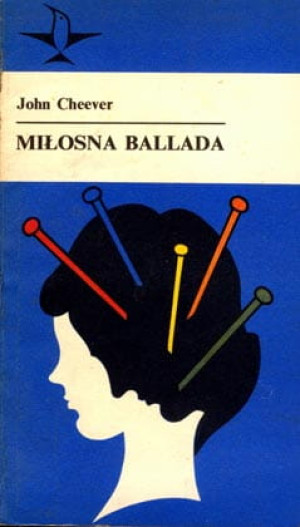
JOHN CHEEVER - MIŁOSNA BALLADA ------ KSIĄŻKA
Producent: LIBRES
Sklep: libres.pl
Cena:
17.39 PLN
UWAGA- JEŚLI W PARAMETRACH SĄ RÓZNICE DATY, STRON, WYDAWNICTWA ITP. PATRZ ZAWSZE NA OPIS AUKCJI ON JEST NAJWAŻNIEJSZY. OPISAutorJohn CheeverTytułMiłosna balladaRok wydania1977OPIS:WydawnictwoKiWIlustracje-Stron195Okładka, oprawaMiękkaStan i inne informacjeDb+Kilka słów o autorze:John Cheever (May 27, 1912–June 18, 1982) was an American novelist and short story writer, sometimes called "the Chekhov of the suburbs." His The Stories of John Cheever won the Pulitzer Prize for Fiction in 1979.[edit] LifeCheever was born inQuincy,Massachusetts. His father owned a shoe factory and was relatively wealthy until he lost his business in the Wall Street Crash of 1929 and deserted his family. During this time in his life, the young John Cheever was often comforted by his older brother Fred. It is said that many of his later works are dedicated to this integral influence in his life. The young Cheever was deeply upset by the breakdown of his parents' relationship. His formal education ended when he was seventeen and left home. Cheever studied at that time atThayerAcademy, but was expelled for smoking. The experience was the nucleus of his first published story, 'Expelled' (1930), which Malcolm Cowley bought for The New Republic. Cheever went to live with his brother inBoston. He wrote synopses for MGM and sold stories to various magazines. After a journey in Europe, Cheever returned to theU.S.He settled inNew York Cityand became friends with such writers as John Dos Passos, E. E. Cummings, James Agee, and James Farrell. In 1933 he attended the Yaddo writers' colony inSaratoga Springs.Cheever died in 1982, at the age of 70, inOssining,New York. He wrestled with alcoholism all of his adult life. In 1987, his widow, Mary, signed a contract with a small publisher, Academy Chicago, for the right to publish Cheever's uncollected short stories. The contract led to a long legal battle, and a book of 13 stories by the author, published in 1994. Two of Cheever's children, Susan Cheever and Benjamin Cheever, became novelists. Susan Cheever's memoir, Home before Dark, revealed Cheever's bisexuality, which was confirmed by his posthumously published letters and journals . Cheever claimed in his diaries to have been diagnosed with Narcissistic Personality Disorder (NPD) by a marriage counselor that his wife forced him to see.[edit] CareerHis most significant works include the Wapshot books (The Wapshot Chronicle won the National Book Award in 1958), and the collection The Stories of John Cheever (which won the Pulitzer Prize). He was a frequent contributor to The New Yorker, and was considered one of the purest examples of "the New Yorker writer." Cheever's main theme was the spiritual and emotional emptiness of life. He especially described the manners and morals of middle-class, suburbanAmerica, with an ironic humor which softened his basically dark vision. A number of Cheever's early works were published in The New Republic, Collier's Weekly, and The Atlantic. In 1935 he began a lifelong association with The New Yorker. He married Mary Winternitz in 1941, and two years later, published his first book, The Way Some People Live. Its stories had originally appeared in magazines and depicted the life ofUpper East Sideand suburban residents or dealt with Cheever's own experiences as a recruit. He had served during World War II as an infantry gunner and member of the Signal Corps.After the war he worked as a teacher and wrote scripts for television. In 1951, Cheever received a Guggenheim Fellowship, which allowed him to become a full-time writer. His second collection, The Enormous Radio And Other Stories, was published in 1953. In the mid-1950s Cheever began writing novels. The Wapshot Chronicle (1957) was an autobiographical story based on his mother's and father's relationship, his family's genteel decline, and his own life. The book won the National Book Award in 1958. In the 1960s Cheever worked briefly as aHollywoodscripwriter on a film version of D.H. Lawrence's The Lost Girl, published in 1920. From 1956 to 1957, Cheever taught writing atBarnardCollege- a job he never liked much. However, he was teacher at theUniversityofIowaand at Sing Sing prison in the early 1970s, and Visiting Professor of Creative Writing atBostonUniversity(1974-75). The Stories Of John Cheever (1978) won the Pulitzer Prize for fiction, the National Book Critics Circle Award, and an American Book Award.[edit] TriviaCheever's bisexuality was referenced in an episode of the television sitcom Seinfeld, "The Cheever Letters", in which correspondence from Cheever is discovered, revealing Cheever had an affair with the fictional character of Susan Ross' father. However, the character George Costanza incorrectly names the title of Cheever's short prison novel Falconer (the name of the prison) as The Falconer.[edit] BibliographyThe Way Some People Live: A Book of Short Stories (1943)The Enormous Radio and Other Stories (1953)The Day the Pig Fell Into the Well (
Przejdź do sklepu